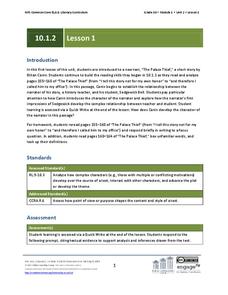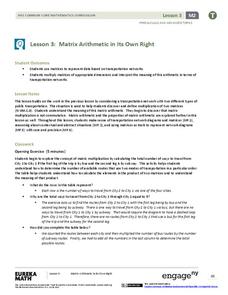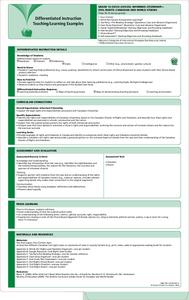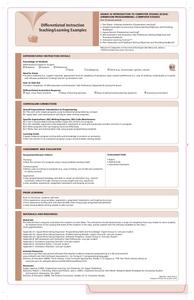EngageNY
Grade 10 ELA Module 1: Unit 2, Lesson 1
The complex relationship between a teacher and his student takes center stage in an instructional activity that asks readers to pay close attention to how author Ethan Canin introduces his characters and how he develops the character of...
EngageNY
Matrix Arithmetic in Its Own Right
Matrix multiplication can seem random to pupils. Here's a instructional activity that uses a real-life example situation to reinforce the purpose of matrix multiplication. Learners discover how to multiply matrices and relate the process...
EngageNY
Grade 11 ELA Module 2: Unit 2, Lesson 10
Audre Lorde's poem "From the House of Yemanjá" describes the speaker carrying two women on her back—she must be strong! Pupils read the second stanza using instructional activity 10 of 14 from the Grade 11 ELA Module 2: Unit 2 series....
EngageNY
Grade 11 ELA Module 2: Unit 2, Lesson 3
What is the distinction between rights and equality? Scholars continue their analysis of "An Address by Elizabeth Cady Stanton" using the third instructional activity from the 14-part Grade 11 ELA Module 2: Unit 2 series. Pupils complete...
EngageNY
Grade 11 ELA Module 2: Unit 2, Lesson 12
Why is it important to make connections across texts? Scholars discover the answer with instructional activity 12 of 14 from the Grade 11 ELA Module 2: Unit 2 series. Pupils analyze the development of ideas in three nonfiction texts,...
EngageNY
End of Unit 2 Assessment, Part 1:Drafting the Argument Essay
An informative resource instructs pupils on how to write their essay drafts about the theme of control in Shakespeare's A Midsummer Night's Dream. Next, scholars complete an Exit Ticket, listing their three favorite characters from the...
EngageNY
Conditions for a Unique Triangle—Two Angles and a Given Side
Using patty paper, classes determine that only one triangle is possible when given two specific angle measures and a side length. As the 10th instructional activity in the series of 29, young math scholars add these criteria to those...
EngageNY
Complementary and Supplementary Angles
Connect algebraic and geometric concepts to solve problems. The first instructional activity in the 29-part series examines complementary and supplementary angle relationships. Scholars write equations to represent the relationships and...
National Endowment for the Humanities
The New Order for "Greater East Asia"
Sometimes the New Order becomes synonymous with its implications for European countries, but what about its consequences for East Asia? The final instructional activity in a four-part series teaches scholars about World War II. High...
iCivics
Step Six: Real World Policies
Sometimes it takes real-world examples to get concepts to click. Use the resource to instruct middle schoolers on the relevancy of public policy in today's world. Exercises include a 5W + H graphic organizer, class discussion, and...
Curated OER
Adding to the Picture: The 1963 March on Washington
Who do your scholars imagine when they think about the civil rights movement? If only a few faces come to mind, this lesson will expand their concepts of the movement's leaders. Learners examine an image of the 1963 March on Washington,...
Achieve3000
Discriminating Phonemes
Develop the fluency of beginning readers one sound at a time with this phonemic awareness lesson. Through a series of whole-class instruction, independent practice, and collaborative learning activities, children practice...
Curated OER
Differentials
Learners engage in a lesson that is about finding the differentials of an equation. They practice computing the differential and apply them to obtaining the approximations for cube roots. The lesson includes examples for the teacher to...
Curated OER
Logarithmic Differentiation
Students engage in a activity that is about the concept of logarithmic differentiation. They practice solving problems to take derivatives of expressions by applying logarithms. The activity includes examples the teacher could use for...
Ontario
Reading Graphic Text
Do students really need to be taught how to read cartoons, comic books, and comic strips? Yes. Just as they need to learn how to read other forms of graphic text such as diagrams, photos, timetables, maps, charts, and tables. Young...
EduGAINs
Introduction to Solving Linear Systems
Word problems offer class members an opportunity to learn the concept of solving linear systems using graphs. Individuals choose a problem based upon preferences, break into groups to discuss solution methods and whether there...
Ontario
Informed Citizenship—Civil Rights
To launch a study of civil rights, class members brainstorm rules and expectations of behaviors at home, in school, in the workplace, and in sports. They then look at civil rights cases and examine the rules embedded in these cases.
Ontario
Animation Programming—Computer Studies
Introduce high schoolers interested in animation programming to fundamental programming concepts so that they can plan and write simple programs.
Ontario
Reading Informational Text
Learning to recognize the importance of the features of information text (i.e., titles, subtitles, endnotes, sidebars, etc.) is the focus of a reading activity designed for middle schoolers. Learners examine how these text features...
Ontario
Critical Literacy—Media Texts
Media texts convey both overt and implied messages. As part of their study of media, class members analyze the language, form, techniques, and aesthetics in a variety of media texts.
EduGAINs
Consumerism, Me and the Natural Environment— Canadian and World Studies
Just as no man is an island, no country is totally independent of other countries. To understand the impact of individual consumer decisions on the global natural environment, class groups consider how the stuff they...
EduGAINs
Coureurs de Bois, First Nation Peoples, and the Fur Trade
The interactions between the Coureurs de bois (runners of the woods) and the First Nation Peoples as they engaged in the fur trade are the focus on this Canadian history exercise. Kids select learning centers based on their learning...
EduGAINs
Migration—Push and Pull Factors
What causes people to move from one place, one city, or one country to another? Using the provided migration questionnaire, learners interview family members about the factors that cause them to be pushed from an area or pulled to...
EduGAINs
Governmental Apology for the Aboriginal Experience—Canadian and World Studies
What constitutes an effective apology? After considering a series of scenarios, class members develop criteria for an effective apology and then use these indicators to evaluate Canada's Prime Minister Harper's apology to former...























